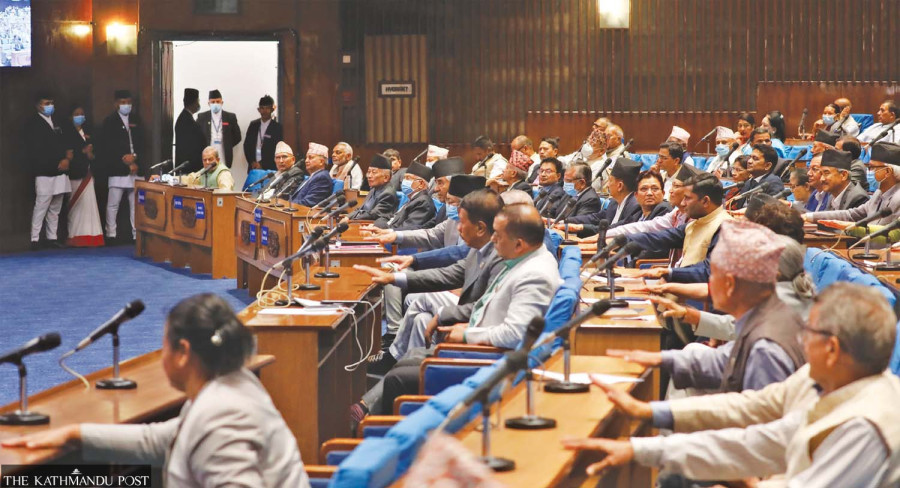National
Seven years since constitution promulgation local governments await federal education Act
The federal government has yet to ready a bill for the law and the term of the current Parliament is ending in four months with elections announced for November 20.
Binod Ghimire
The jurisdiction over school education has been the most debated issue between the federal and local governments in the last five years.
While the local governments have been saying they have constitutional authority to manage education up to grade 12, the federal government is reluctant to delegate the authority. Schedule 8 of the constitution gives local governments the explicit authority of basic and secondary education while schedule 9 puts education under the concurrent authority of the federal, provincial and local governments.
The constitution lists out the authorities in broad terms which are defined clearly by the Acts and regulations. They are also the prerequisite for the implementation of the constitution. However, around seven years since the promulgation of the constitution and five years since last parliamentary elections, the government is yet to register a bill to promulgate a federal education act.
When he was appointed minister for education, science and technology in October last year, Devendra Paudel said preparing the bill for the Act would be his priority. He has reiterated his commitment on several occasions. However, over a year since he took charge, the education ministry is yet to finalise the bill.
Paudel is the fifth education minister since the promulgation of the Constitution of Nepal and third since the last general elections. And every minister who preceded Paudel has made similar claims. No minister, however, has fulfilled their claim to have the Act in place.
The officials at the Education Ministry say they have already prepared a draft of the federal education bill along with five others which are stuck at the Finance Ministry. “We have urged the Finance Ministry to give the clearance to the bills,” Education Secretary Ram Krishna Subedi, told the Post. “Education minister raised the issue in a meeting of the ministers called by the prime minister on August 3.”
The local representatives say they have completed their term without getting to exercise their constitutional authority in lack of the law. Even though the first term of local governments since the promulgation of the constitution is already over, there is no certainty on when the Act would be formulated. The recent local level elections were held on May 13.
“Allowing the local governments to oversee the school education was one of the most important aspects of federalism,” Bhim Prasad Dhungana, mayor of Dhading’s Neelkantha Municipality, told the Post. “We completed our full tenure in uncertainty and it doesn’t seem like the Act will be promulgated anytime soon.”
Local government representatives say with the federal and provincial assembly elections set to be held later this year, they are not hopeful that the present House will pass the law. The government, within a few days, is expected to make an official announcement to conduct the elections on November 20. As it takes over a month for a bill to get through Parliament, it will not be possible to promulgate the Act from the ongoing parliamentary session if the bill is not registered soon.
The constitution allows local governments to make laws. However, the constitution also says such laws will be void to the extent they contradict the federal law. On different occasions in the past, the federal government has issued circulars to local governments ordering them not to make laws until related federal Acts are formulated. A writ petition challenging the circular is sub judice at the Supreme Court. “The court has not scheduled the final hearing for my petition,” advocate Sunil Ranjan Singh told the Post. “A verdict from the court would have ended the ongoing confusion.”
Education experts say lack of legal clarity has left the entire education sector in shambles. “The Act is a must to bring school education on track,” Binay Kusiyait, an education expert, said. “Not just the education ministry but the successive governments must be held accountable for the delay.”
Lack of a constitutional deadline for promulgation of laws like the one related to the fundamental rights is also responsible for the delay, experts said.
The constitution made it mandatory to have laws related to fundamental rights in place within three years since its promulgation. It also said the existing Acts that contradict the constitution must be revised within a year since the first meeting of the federal parliament. The government prepared the laws within the constitutional deadline. However, as there is no such constitutional deadline for the promulgation of federal laws, successive governments have become negligent in discharging their duties, Kusiyait said.
“The reluctance in promulgating laws like the Federal Education Act is one of the reasons why our federalism hasn’t been fully implemented yet,” he said.




 10.12°C Kathmandu
10.12°C Kathmandu















